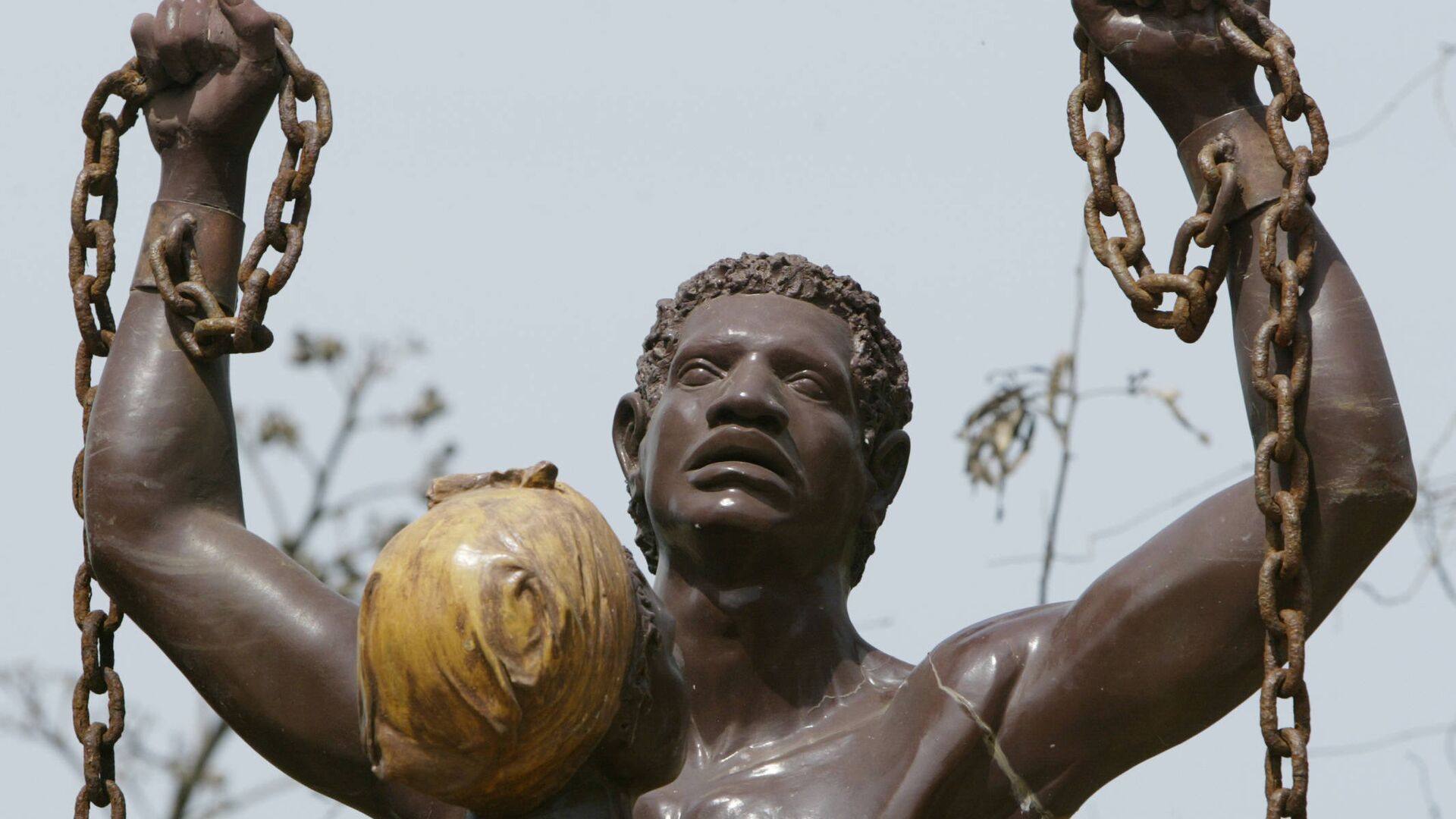https://en.sputniknews.africa/20230920/world-powers-should-pay-reparations-for-colonialism-enslavement-of-africans-un-reports-says-1062237493.html
World Powers Should Pay Reparations for Colonialism, Enslavement of Africans, UN Report Says
World Powers Should Pay Reparations for Colonialism, Enslavement of Africans, UN Report Says
Sputnik Africa
In early July, ambassadors and representatives of African Union member countries and the Caribbean Community (CARICOM) political and economic union discussed... 20.09.2023, Sputnik Africa
2023-09-20T13:37+0200
2023-09-20T13:37+0200
2023-09-20T14:30+0200
sub-saharan africa
united nations (un)
slavery
reparations
belgium
republic of the congo (congo)
african union (au)
west
https://cdn1.img.sputniknews.africa/img/103042/62/1030426203_0:132:2133:1332_1920x0_80_0_0_7edcae158864ed93b5f9b37ccc75a46f.jpg
The United Nations called on former colonial powers, particularly in the West, to provide African people with financial compensation for the years of colonialism and enslavement, the UN report, which was published on Tuesday, said.The report added that “compensation for any economically assessable damage, as appropriate and proportional to the gravity of the violation and the circumstances of each case,” should be considered as a form of reparation.The document also outlined the impact caused by the colonialism and enslavement, including massive deportation of human-beings and racially discriminatory practices such as “segregation and apartheid, that perpetuated racial discrimination, oppression, and inequalities.”Apart from financial compensation, the report suggested other measures to tackle the lasting consequences of enslavement, including a public apology, medical and psychological rehabilitation, and guarantees of non-repetition as forms of settlement.Among the states that have taken some steps towards addressing past legacies, the document named Belgium, which adopted a road map for the restitution of cultural artefacts of the Democratic Republic of Congo and handed over one in 2022. France, which adopted a law on the restitution of cultural property to Benin and Senegal in 2020, is also mentioned as a country that takes actions on the issue.Nevertheless, the report stressed “no state has comprehensively accounted for the past and addressed its contemporary legacies and ongoing manifestations.”As for acknowledgement of the colonial crimes, in early July, Dutch King Willem-Alexander issued a historic royal apology for the Netherlands' involvement in slavery, saying he felt "personally and intensely" affected. In late July, Representatives of a diverse array of African and Caribbean organizations met in the Barbados capital Bridgetown as part of a Reparations and Racial Healing Study Tour focused on advocating for reparations for slavery, Jamaica's University of the West Indies (UWI) stated.The university added that the event in Barbados included multiple discussions and "critical reflection on addressing harms suffered within Africa and throughout the Diaspora." Last June, Barbados Prime Minister Mia Amor Mottley publicly called for Europe to pay reparations to enslaved countries.
belgium
republic of the congo (congo)
west
Sputnik Africa
feedback@sputniknews.com
+74956456601
MIA „Rossiya Segodnya“
2023
Rasina Musallimova
https://cdn1.img.sputniknews.africa/img/07e7/0a/17/1063019139_0:0:646:646_100x100_80_0_0_348c74b69cf86748a53875f8148a2f85.jpg
Rasina Musallimova
https://cdn1.img.sputniknews.africa/img/07e7/0a/17/1063019139_0:0:646:646_100x100_80_0_0_348c74b69cf86748a53875f8148a2f85.jpg
News
en_EN
Sputnik Africa
feedback@sputniknews.com
+74956456601
MIA „Rossiya Segodnya“
Sputnik Africa
feedback@sputniknews.com
+74956456601
MIA „Rossiya Segodnya“
Rasina Musallimova
https://cdn1.img.sputniknews.africa/img/07e7/0a/17/1063019139_0:0:646:646_100x100_80_0_0_348c74b69cf86748a53875f8148a2f85.jpg
united nations (un), slavery, reparations , belgium, republic of the congo (congo), african union (au), west
united nations (un), slavery, reparations , belgium, republic of the congo (congo), african union (au), west
World Powers Should Pay Reparations for Colonialism, Enslavement of Africans, UN Report Says
13:37 20.09.2023 (Updated: 14:30 20.09.2023) In early July, ambassadors and representatives of African Union member countries and the Caribbean Community (CARICOM) political and economic union discussed during a meeting in Barbados reparations as the way to mitigate the impact of slavery, colonialism and racism.
The United Nations called on former colonial powers, particularly in the West, to provide African people with financial compensation for the years of colonialism and enslavement, the
UN report, which was published on Tuesday, said.
“The present report, submitted pursuant to General Assembly resolution 69/16, focuses on reparatory justice for people of African descent. It acknowledges increased acceptance of the need to address the continuing impacts of enslavement and colonialism, including through reparatory justice,” the report reads.
The report added that “compensation for any economically assessable damage, as appropriate and proportional to the gravity of the violation and the circumstances of each case,” should be considered as a form of reparation.
The document also outlined the
impact caused by the colonialism and enslavement, including massive deportation of human-beings and racially discriminatory practices such as “segregation and apartheid, that perpetuated racial discrimination, oppression, and inequalities.”
“It is estimated that between 25 and 30 million people were violently uprooted from Africa for enslavement. The Trans-Atlantic trade in enslaved Africans caused the largest and most concentrated deportation of human beings involving several regions of the world during more than four centuries,” the report states.
Apart from financial compensation, the report suggested other measures to tackle the lasting consequences of enslavement, including a public apology, medical and psychological rehabilitation, and guarantees of non-repetition as forms of settlement.
Among the states that have taken some steps towards
addressing past legacies, the document named Belgium, which adopted a road map for the restitution of cultural artefacts of the Democratic Republic of Congo and handed over one in 2022. France, which adopted a law on the restitution of cultural property to Benin and Senegal in 2020, is also mentioned as a country that takes actions on the issue.
Nevertheless, the report stressed
“no state has comprehensively accounted for the past and addressed its contemporary legacies and ongoing manifestations.”“Reparatory justice is not just about addressing the wrongful acts of the past, it is about building societies that are truly inclusive, equal and free from racism and racial discrimination. A comprehensive approach should, therefore, address the past, present and future,” UN High Commissioner for Human Rights Volker Turk said.
As for acknowledgement of the colonial crimes, in early July, Dutch King Willem-Alexander issued a
historic royal apology for the Netherlands' involvement in slavery, saying he felt "personally and intensely" affected.
In late July, Representatives of a diverse array of African and Caribbean organizations
met in the Barbados capital Bridgetown as part of a Reparations and Racial Healing Study Tour focused on advocating for reparations for slavery, Jamaica's University of the West Indies (UWI) stated.
The university added that the event in Barbados included multiple discussions and "critical reflection on addressing harms suffered within Africa and throughout the Diaspora."
Last June, Barbados Prime Minister Mia Amor Mottley publicly called for Europe to pay reparations to enslaved countries.


